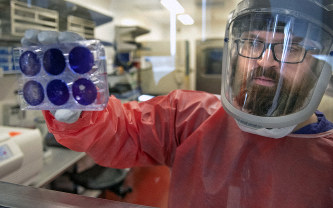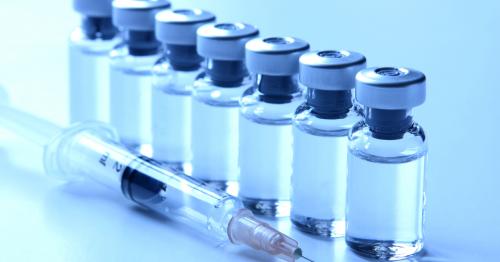SCIENTISTS racing to find a coronavirus vaccine will infect volunteers with a strain of the deadly bug – for £3,500.
Up to 24 people at a time will be paid to be infected with a less harmful form of Covid-19 at a lab in east London, as part of a global experiment.
Volunteers will be infected with a form of coronavirus in a bid to find a vaccine, image shows a scientist at a lab in Israel where work is also underway to find a vaccineCredit: AFP – Getty
The participants will be regularly monitored by doctors in protective gear while in quarantine for 14 days.
Experts hope it will help them develop a vaccine that could be used next winter to protect the elderly and those with underlying health conditions.
Testing will begin once Hvivo, the company that runs the quarantine unit at the Queen Mary BioEnterprises Innovation Centre in Whitechapel, has secured permission from the UK’s Medicines and Healthcare products Regulatory Agency (MHRA).
Common strains
Scientists will infect participants with two common strains of coronavirus – 0C43 and 229E – which cause mild respiratory illness.

Professor John Oxford, an expert in virology at the Queen Mary University of London, said volunteers would feel the symptoms of a cough or cold, which would model those of Covid-19.
He told The Times: “If it works on our little virus, it is very likely to work in the real world.”
Before they can take part, volunteers will be questioned about their medical history and given blood, urine, and cardiac tests.
They will also be screened to ensure they don’t already have antibodies against coronavirus.
Andrew Catchpole, Hvivo’s chief scientist, told the paper: “We’ve actually all been exposed to many coronaviruses, which means we could have some kind of underlying immunity to it.”
Participants who are given clearance to take part will then attend the lab where they will be inoculated before going into isolation for 14 days.
During that time they will be unable to have physical contact with other people.
The only human contact they will have is with nurses and doctors in protective gear and ventilators who will enter the room for regular nasal swabs and blood tests.
Medics will also collect any dirty tissues so they can be weighed to measure their “viral load”.
Researchers say it will allow them to test the efficacy of new viruses and antiviral medications in a safe environment.
The testing is part of a $2bn global effort to find a vaccine for Covid-19, which has now infected more than 110,00 people worldwide.
‘Milder cousin’
Dr Edward Wright, a senior lecturer in microbiology at the University of Sussex, told The Sun Online: “There are several coronaviruses – seven types can infect humans.
“They include OC43 and 229E, which are being used in this study and are responsible for a large proportion of common colds.
“The other three are SARS, MERS and this new coronavirus, known as SARS-CoV-2.
It is very similar to how the whole process of vaccination was first identifiedDr Ed WhiteUniversity of Sussex
“It is not necessarily unusual for researchers to infect people with a milder cousin of the disease to stimulate an immune response.
“One of the very common approaches is to use a version of the virus that has been inactivated, meaning it’s unable to cause the disease and is chemically inactivated.
“This actually is very similar to how the whole process of vaccination was first identified.”
Dr Wright, who isn’t involved in the new study, added that from his understanding those taking part in the trial will have to undergo regimented procedures and only people who are considered healthy would be infected.
He added: “There are guidelines and regulations on who would be enrolled and it would rule out those people with underlying health conditions.
“If they’re healthy individuals, it is highly unlikely they will develop anything more serious than the symptoms of a common cold.
“For those who are thinking about taking part and are healthy, I would not be concerned.”
Cash injection
Last week, the UK Government pledged £46million for vaccine research and faster testing.
Boris Johnson’s funding boost is coming from the UK’s foreign aid budget and brings the Government’s commitment up to £91million.
Mr Johnson is confident that the funding will be able to deliver a vaccine in a year’s time.
It comes as a top medical expert warned Brits can now catch coronavirus “from anyone, anywhere, anytime” — and admitted we have lost track of who has it.
A surge in cases not linked to trips abroad, or contact with known carriers, means the bug is now spreading from person to person within the UK.
Dr Bharat Pankhania, senior clinical lecturer at the University of Exeter, said: “The implication is we are now in the phase of ‘community transmission’.
“We no longer know where the virus is. You could catch it from anyone, anywhere, anytime — in your supermarket, coffee shop, petrol station or pub.”

